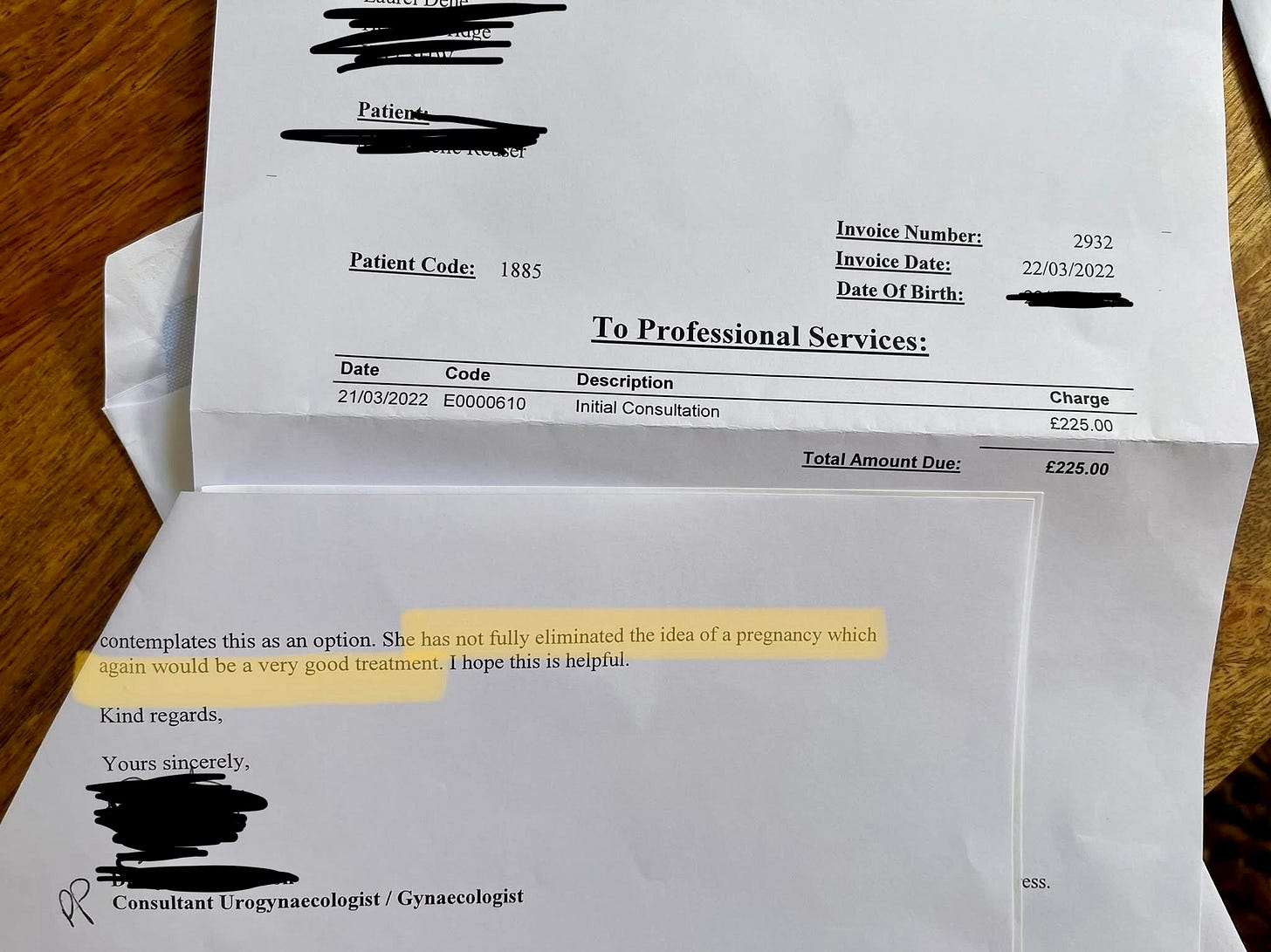Pregnancy as a Treatment
My PMDD story, a viral Reddit post, and the trouble with calling out poor advice.
After The Guilty Feminist Podcast posted that people as young as 17 are still being told to “have a baby” to ease chronic Endometriosis pain, I thought about my own experience with a private gynaecologist. A few years earlier, the consultant told me to just get pregnant too. The experience left me so unsettled that I buried it, until now. I wrote a Reddit post and it went viral. When the post was eventually pulled, it left me stuck in a hole, which I may or may not have dug myself by including a picture of a follow-up letter which stated the gynaecologist’s name.
In that hole, women like me are forced to remain silent in fear of libel, and nothing ever changes. It had me thinking: Should we be able to call out questionable medical advice, especially when it’s dished out by a limited company?
When I was told that pregnancy was a good treatment for my symptoms, my jaw hit her (yes, her!) desk like a cartoon character. Surely pregnancy is not a treatment. It isn’t an intervention like medicine, exercise or a diet as advised by a professional. It’s just… me getting pregnant. And because of my symptoms, it was the last thing on my list of things to do with my life. In addition to debilitating pelvic pain, I was struggling with depression, intrusive thoughts and extreme irritability. I felt so down, I hid myself away. I couldn’t stand to be around people, let alone make babies.
I had initially approached her as I thought I had PMDD (Premenstrual Dysphoric Disorder) and asked to be assessed. Like any millennial, I’d researched my symptoms online and quickly saw how tightly they lined up with my menstrual cycle. I’d quit the pill at 34, hoping to embrace my natural cycles and fix the random spotting and heavy bleeds I’d been getting on the combined pill.
Tracking with an app, I learned the ten-or-so days before my period fall within the luteal phase. Also known as HELL WEEK in my house. No one taught me at school about cycles – that oestrogen declines, and progesterone rises before menstruation, preparing for a clear-out when no egg is fertilised. During this phase, my thoughts ran wild: change jobs, sell the house, end the relationship, move into a campervan.
On top of the inner turmoil, I had restless legs, migraines, brain fog, heart palpitations, extreme cramps. Then the minute my period arrived I’d feel better and promptly forget last week’s chaos. But I still had to rebuild my life, gain back my partner’s trust and catch up on a week's worth of work. After my period, in the follicular phase, I felt invincible, productive, sociable and sexy. I called her my normal self. Then I would feel the inevitable twinge in my abdomen (hello, ovulation!) and the restlessness crept back in.
None of this sounds like a solid foundation for pregnancy and the arrival of an actual human being. Because guess what? After breastfeeding, your cycles return.
Having suggested PMDD, I was offered an IUD, a chemical menopause or, if that failed, a rather drastic hysterectomy. Then came: 'Have you thought about having babies? It’s about time.' I explained my situation: busy career, fear of pregnancy and birth, and a partner (already a dad to a teenager) with zero inclination to start again. It was effectively ruled out.
Yet, my follow-up letter still said pregnancy was a good treatment. I don’t believe pregnancy should ever be considered a treatment. It involves a second party, creates a whole new person and costs a lot of money. So why are people being told to just get pregnant?
Old ideas die hard, especially when no one is held accountable. Pregnancy as a cure dates back to antiquity and early gynaecology, when it was framed as a “reset” for women’s health. Doctors would even induce a state of “pseudopregnancy” with high levels of hormones to reproduce the improvement noted in endometriosis during pregnancy. A quick look at modern day guidance on PMDD makes it clear: evidence-based treatments include SSRIs, certain hormonal contraceptives, CBT and GnRH analogues or surgery as a last resort. Pregnancy is not recommended for either Endometriosis or PMDD.
Yes, some resources note that PMS symptoms disappear during pregnancy, but when prescribing pregnancy, consultants ignore what happens after birth. People with PMDD or severe PMS appear to be at higher risk of depression during or after pregnancy, which makes “just get pregnant” a dangerously glib suggestion.
A complaint to the hospital led nowhere. The complaints manager sounded overworked, perhaps juggling negligence cases involving wrongly amputated legs. I left the call feeling a bit ridiculous for even reaching out.
Fast forward 2 years, I took to Reddit to see if others had receipts of pregnancy as treatment in the shape of actual letters. I was hoping to use images for a potential art project tied to my PhD. Then Reddit removed the post a day later because the picture of my letter included the gynaecologist’s name. I’d assumed it was fine with she-who-shan’t-be-named operating as a limited company, but I was warned about defamation. Which raises a question: If we can’t publicly hold healthcare providers to account, how does anything change? If you can take to Twitter to complain about your Jet2 holiday, then why can’t you complain about dodgy medical advice? And at £225-a-pop I felt cheated.
So, to keep the solicitors calm, I’ve stripped out names and blurred any identifying details. What remains are the ghosts of Victorian gynaecology, immortalised in this neatly typed letter. If you have your own just get pregnant receipts, letters or clinic notes, get in touch. In the meantime, I’ll be a good girl and go back into my hole. For now.




